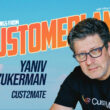For over 35 years I’ve worked to help companies overcome their database marketing challenges. There isn’t much I haven’t seen and tackled over that time. Although much has changed, the fear and paranoia surrounding data have largely remained the same.
Why is that?
In my experience, the fear is of the unknown. The very term data can provoke connotations of complexity, of being the sole realm of specialists. It can be anxiety-inducing.
Sure, marketers want the insights data can bring, but often prefer that somebody else take care of data collection and management. And they definitely want someone else to figure out how to use it properly. If only there was a magic wand.
No one likes to feel stupid. On the contrary, we’re constantly looking for affirmation of our own competence—so much so that personality psychologist Robert White believed that competence could be thought of as a “fundamental human need.”
The problem is that data isn’t easily compartmentalized, nor can it be simply outsourced without instructions as to how to manage it. Instead, it needs to be a fundamental part of business operations and involve a variety of stakeholders if it’s to be effective.
One ongoing challenge is getting marketers to a position where they can confidently discuss data; where they can ask questions and genuinely feel comfortable when doing so. It’s about helping companies understand their business or customer issues and see a way forward, as opposed to simply “diagnosing” a problem, prescribing a course of action, and hoping.
A long-established exercise that still works well is gathering a cross-functional team together and handing out index cards, instructing the team to write down what they view as their contact information. Once everyone sees how others interpret the same task, and the different ways people provide even their own data, they’ll grasp a baseline understanding from which to build on.
When broken down like this, everyone gets it. Database marketing is ultimately no different than the combustion engine; the complete item may be complex, but once broken down into little pieces, everyone can understand the various elements.
Over my many years in the business, the index cards I use for this exercise with clients have gotten bigger (representing the greater amount of data being gathered), but the underlying principles remain the same.
Having a working knowledge of and confidence in understanding and using data is hugely beneficial to marketers, particularly because of what famed psychology professor Edward L. Deci termed “behavior-outcome linkages.” Behavior-outcome linkages are incredibly important to motivation by increasing people’s willingness to get involved. Once marketers see that their input influences the outcome of a data strategy, for example, they’re much more motivated to contribute, which fosters all-important collaboration and snowballs the positives.
I often find that one of my first roles as a consultant is as a translator between marketers and the data team. The classic scenario involves marketers requesting certain information from the analysts, only to be asked how they plan to use it. The marketers then become somewhat defensive, reacting along the lines of, “Don’t ask me why I want it, just get it to me!” Next thing you know, the relationship is strained as the data suppliers fail to “correctly” interpret the request.

The art of communication in such scenarios (the marketer’s very arena) is vital. A technique that works well here, especially when marketers are looking for the help of a vendor in solving a data challenge, is visualization: Each person involved has to come up with five questions they’d like answered about the issues they’re having. Bringing everyone together, we then illustrate what the solution needs to look like. The result is something that vendors can work from to address the challenge and to propose solutions. Over time, this becomes natural, removing the need for a translator as everyone begins speaking a common language.
The human aspect of data management has always been of great importance—but all too often has remained overlooked. That needs to change, as it plays such an important role in so many aspects of data. One example is the urge to “rip and replace” complete data solutions when something isn’t working. Once people understand all the parts and processes of data collection and management, they can better address issues from a modular perspective, fixing or replacing only the bits that actually need attention.
I was recently asked whether companies are ever “beyond help” when it comes to data management and the related challenges. I do not believe anyone is beyond help. Sometimes fear and lack of knowledge prevent people from moving forward, making them appear “beyond help”—until they get the information they need to take action. Those who put their egos aside and embraced help can achieve remarkable things.
To marketers, I say this: There are people who can handle the “hard bit” of data management for you. You just need to know what you want to achieve with specific data and then communicate it in a way that’s understandable to your internal and external data partners.

“Data Therapist” Bernice Grossman is principal consultant and founder of DMRS Group and a DMCNY Silver Apple Award honoree. She is a noted database marketing expert and has spoken on the subject at numerous Direct Marketing Association, National Center for Database Marketing, and Direct Marketing Business conferences. Additionally, Grossman has taught at NYU’s Direct Marketing Program. She is frequently quoted in such leading trade publications as Business Marketing, DIRECT, TheCustomer, Forbes, Direct Marketing News, and Target Marketing.
This article originally appeared in DMCNY. Photo by Antonino Visalli on Unsplash.











